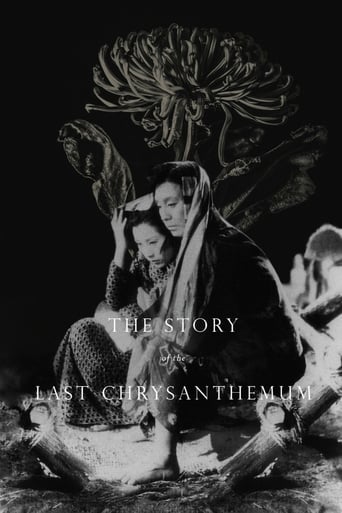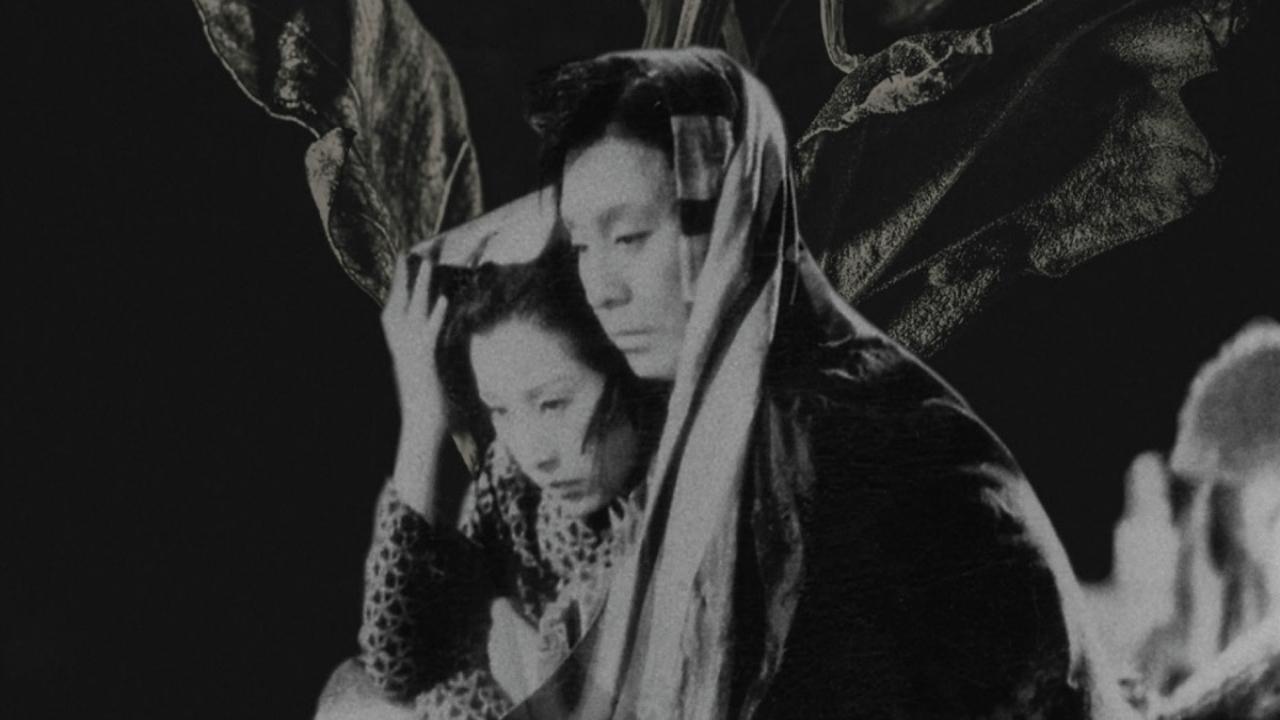lasttimeisaw
I am a tyro in view of Japanese cinema (one reason why I often feel ashamed to call myself a cinema buff), and among Mizoguchi's filmography, my only previous viewing is his later epic saga SANSHO THE BAILIFF (1954, 7/10), a haunting revenge tale with a cogent message about sacrifice and redemption, whereas in THE STORY OF THE LAST CHRYSANTHEMUMS, which is shot much earlier, pre-WWII, the same ideas have been incubated through a love story barred by the class gulf, Otoku (Mori) is a symbol of devotion and forbearance and Kikunosuke (Hanayagi) is a man of moral integrity, occasionally under the affliction of hardship, he is worn out and evinces rather disappointing male chauvinism, but she accepts and assimilates all these negative effluvia until the ultimate sacrifice, as long as Kikunosuke can regain his social status and fame through his bona-fide acting after years of studying and training. What a role model couple, depicted as the kernel of the mentality of Japan at that time, behind every successful man there is a capable wife, who doesn't has her own ranking or vocation, but should be fully devoted and (if lucky) intelligent to assist her husband (maybe now is still the same), a standpoint may sound outdated and even putrid nowadays. At the first scene, the novel milieu of Kabuki brings immediate exotic flavor to foreign viewers, but it is hard to be truly appreciated in an outsider's eyes, I can not tell the qualitative leap of Kikunosuke's acting skill, plus the orbit of the plot is stereotyped and take the twist and turn for granted, Hanayagi and Mori's acting is too hammy for my taste as well. But impressively the film contrives outstanding mise en scène, the camera never dare to be too near its characters, as we watch from a distance, everything is presented in an implicit rhythm with gracefulness and subtlety, which wholesomely leads its viewers through the voyage of a tearjerker behind the times with its mellifluous soundtrack sets the mood. I might feel a bit disheartened about this film, but it never too late to excavate the treasure of Japanese cinema, so I will keep up and continue to divulge my true feelings after watching them.PS: one interesting note, I find it rather peculiar to put salt on watermelon, at least not in my culture, the mixed salty and sugary flavor doesn't seem to be scrumptious to me, anyone who has the experience can give an explanation?
Od1n
I've read some very exciting comments about this picture and in the middle of the movie I realized how I'm disappointed a bit. Keep your expectations low, lads. It's not Mizoguchi's screenplay like "Sisters of Gion", this movie based on a book. Classic story, very predictable, with straightforward acting, especially lead woman with tears and tempted voice all the time.Although a beautiful visual look, I couldn't connect myself with the movie. Unlike to "Naniwa ereji" (Osaka Elegy, 1936) and "Gion no shimai" (Sisters of the Gion, 1936), which are also very simple, but truthful and realistic, with sudden thought provocative endings. I prefer and recommend this movies ahead of "Zangiku monogatari".
MartinHafer
I wish I spoke fluent Japanese--then I am sure I could have enjoyed the movie so much more. That's because this movie had horrible subtitles and often sentences or more were simply left untranslated or 50 words in Japanese were distilled down to only 3 or 4 words. In essence, the translators were very lazy and did a terrible job. Some might not mind this, but since I am a very avid fan of Japanese films it seriously detracted from the experience. This does NOT mean it is unwatchable or you should avoid it. In fact, if anyone knows of a better version available to Western audiences, let me know.The plot itself seems very familiar and is reminiscent of some other films, as its main ideas are respect for your elders and unrequited love. The main character is madly in love with his step-brother's nursemaid and the family strongly opposes it. I don't really think I need to divulge more but felt that the actors did a fine job and the story itself was interesting.UPDATE: There is a new DVD version from Criterion and I assume it's much better than the DVD I saw. Criterion always seems to do good jobs with subtitles on their film releases.
Kalaman
Along with "Sisters of the Gion"(1936) and "Osaka Elegy"(1936), "Zangiku monogatari" is a strong candidate for Kenji Mizoguchi's finest pre-war film. It is one of the greatest and most beautiful films I have ever seen - a profoundly sublime, heartbreaking love story between a Kabuki actor(Shotaro Hanayagi) and working class servant (Kakuko Mori) who makes sacrifices to herself to ensure his theatrical success. The film, filled with dazzling long takes and rich Sternbergian compositions, centers on Mizoguchi's characteristic theme: the shallowness of men and the generosity of women. Rarely has a Mizoguchi film seem at once so sublime and devastating in its impact. The final sequence alone is among the finest in all of cinema.My favorite Mizoguchi remains "The Life of Oharu"(1952); "Zangiku monogatari" is not very far behind.


 AD
AD


